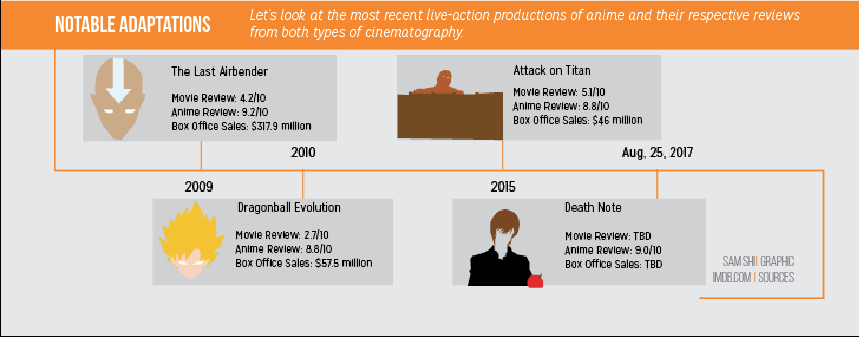First of all, I want to establish that I am not an anime expert; however, I am very aware of the controversy regarding American productions of anime. The Hollywood version of “Death Note,” scheduled to be released on Netflix Aug. 25, has received relentless backlash, similar to previous American adaptations of anime such as “Ghost in the Shell” and “Dragonball Evolution.” This backlash response from anime fans trickles down to one topic: whitewashing.
I am not trying to make it seem like every aspect of American versions of anime production is terrible. In fact, to be fair to the Netflix adaptation, a portion of the main characters such as Yagami Light and Misa Amane are actually portrayed as white in the Japanese anime version of “Death Note.” Moreover, in the case of previous adaptations, some elements such as plot tend to be familiar to audiences that know what they should expect from an adequate adaptation.
At the same time, however, there are still faults that many, including myself, think outweigh these positive aspects. Going back to “Death Note,” the original
version also has its fair share of Asian main characters such as L and Souichiro Yagami. With this being said, neither of these characters are played by Asian actors. Furthermore, in other adaptations like “Dragonball Evolution,” even main roles such as Goku, one of the most distinctively Asian and well-known anime characters in existence, was played by a Caucasian. The problem is not that there are Caucasians being casted for these anime adaptations; the problem is that there aren’t enough Asians in the right roles. What this translates into is that many characters in these American adaptations are rendered unrelatable simply because they were not the same as envisioned by fans. So, it is safe to say that these adaptations indeed warrant disappointment from both anime fans, including Caucasians, and Asian Americans

Moreover, the whitewashing has not decreased since the #OscarsSoWhite movement. Although orignially intended to address the discriminatory recognition of African Americans, the movement shed light on Hollywood’s unfair casting of all minority actors and actresses. Since then, film and TV studios have made efforts to cast more Asians or Asian Americans in their productions, yet many of these castings are for minor roles. In the production of “Death Note,” Asians only play minor characters or extras.
This evident underrepresentation of Asian Americans in originally Asian genres such as anime clearly warrants my view that excessive whitewashing, as commonly practiced in today’s film industry, is yet another symbol of inequality that exists today and actually detracts from the intended context of anime-style productions. Why else would there be so much backlash for these anime adaptations? I do not think at all that it is wrong to have Caucasians, African Americans, etc. to have leading roles in these films; in fact, I am a proponent of diversity. As a proponent of diversity, however, I side with the fact that there should be more representation than there is now of Asians in both anime-style adaptations and American films in general.

































![AI in films like "The Brutalist" is convenient, but shouldn’t take priority [opinion]](https://hilite.org/wp-content/uploads/2025/02/catherine-cover-1200x471.jpg)









































![Review: “The Immortal Soul Salvage Yard:” A criminally underrated poetry collection [MUSE]](https://hilite.org/wp-content/uploads/2025/03/71cju6TvqmL._AC_UF10001000_QL80_.jpg)
![Review: "Dog Man" is Unapologetically Chaotic [MUSE]](https://hilite.org/wp-content/uploads/2025/03/dogman-1200x700.jpg)
![Review: "Ne Zha 2": The WeChat family reunion I didn’t know I needed [MUSE]](https://hilite.org/wp-content/uploads/2025/03/unnamed-4.png)
![Review in Print: Maripaz Villar brings a delightfully unique style to the world of WEBTOON [MUSE]](https://hilite.org/wp-content/uploads/2023/12/maripazcover-1200x960.jpg)
![Review: “The Sword of Kaigen” is a masterpiece [MUSE]](https://hilite.org/wp-content/uploads/2023/11/Screenshot-2023-11-26-201051.png)
![Review: Gateron Oil Kings, great linear switches, okay price [MUSE]](https://hilite.org/wp-content/uploads/2023/11/Screenshot-2023-11-26-200553.png)
![Review: “A Haunting in Venice” is a significant improvement from other Agatha Christie adaptations [MUSE]](https://hilite.org/wp-content/uploads/2023/11/e7ee2938a6d422669771bce6d8088521.jpg)
![Review: A Thanksgiving story from elementary school, still just as interesting [MUSE]](https://hilite.org/wp-content/uploads/2023/11/Screenshot-2023-11-26-195514-987x1200.png)
![Review: "When I Fly Towards You", cute, uplifting youth drama [MUSE]](https://hilite.org/wp-content/uploads/2023/09/When-I-Fly-Towards-You-Chinese-drama.png)
![Postcards from Muse: Hawaii Travel Diary [MUSE]](https://hilite.org/wp-content/uploads/2023/09/My-project-1-1200x1200.jpg)
![Review: "Ladybug & Cat Noir: The Movie," departure from original show [MUSE]](https://hilite.org/wp-content/uploads/2023/09/Ladybug__Cat_Noir_-_The_Movie_poster.jpg)
![Review in Print: "Hidden Love" is the cute, uplifting drama everyone needs [MUSE]](https://hilite.org/wp-content/uploads/2023/09/hiddenlovecover-e1693597208225-1030x1200.png)
![Review in Print: "Heartstopper" is the heartwarming queer romance we all need [MUSE]](https://hilite.org/wp-content/uploads/2023/08/museheartstoppercover-1200x654.png)



